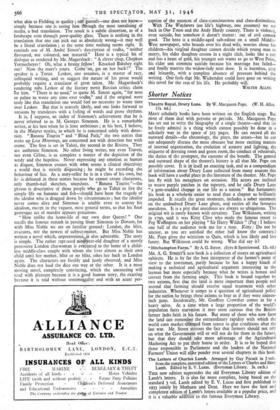Shorter Notices
Theatre Royal, Drury Lane. By W. Macqueen Pope. (W. H. Allen. 17s. 6d.)
MANY scholarly books have been written on the English stage. But most of them deal with persons or periods. 'Mr. Macqueen Pope has set out to write the biography of a single theatre—and that (as he freely admits) is a thing which cannot possibly be done in a scholarly way in the space of 325 pages. He can record all the outward details—the chronology, the plays, the actors—but he can not adequately discuss the more obscure but more exciting matters of internal organisation, the evolution of scenery and lighting, the etiquette of dressing room and green room, the conduct of rehearsals the duties of the prompter, the customs of the benefit. The general and outward shape of the theatre's history is all that Mr. Pope can possibly cover. It is in itself an exacting task, and as a compendium of information about Drury Lane collected from many sources this book will have a useful place in the literature of the theatre. Mr. Pope lets fly with his metaphors on occasion. His actors are inclined to weave purple patches in the tapestry, and he calls Drury Lane "a gem-studded chaptew in our life as a nation." But fortunately his book as a wholema easier to read than a chapter so brilliantly impeded. It recalls the great moments, includes a sober statement on the undoubted Drury Lane ghost, and recites all the favourite anecdotes. It is a pity that anecdotes are always so ubiquitous. The original wit is rarely known with certainty. Tate Wilkinson, writing in 1790, said it was Kitty Clive who made the famous retort to Peg Woffington on her playing "Sir Harry Wildair " (Peg : I believe one half of the audience took me for a man. Kitty : Do not be uneasy, as you are satisfied the other half know the contrary.) Mr. Pope gives the witticism to Quin, which is less likely and less funny. But Wilkinson could be wrong. Who did say it?






























 Previous page
Previous page